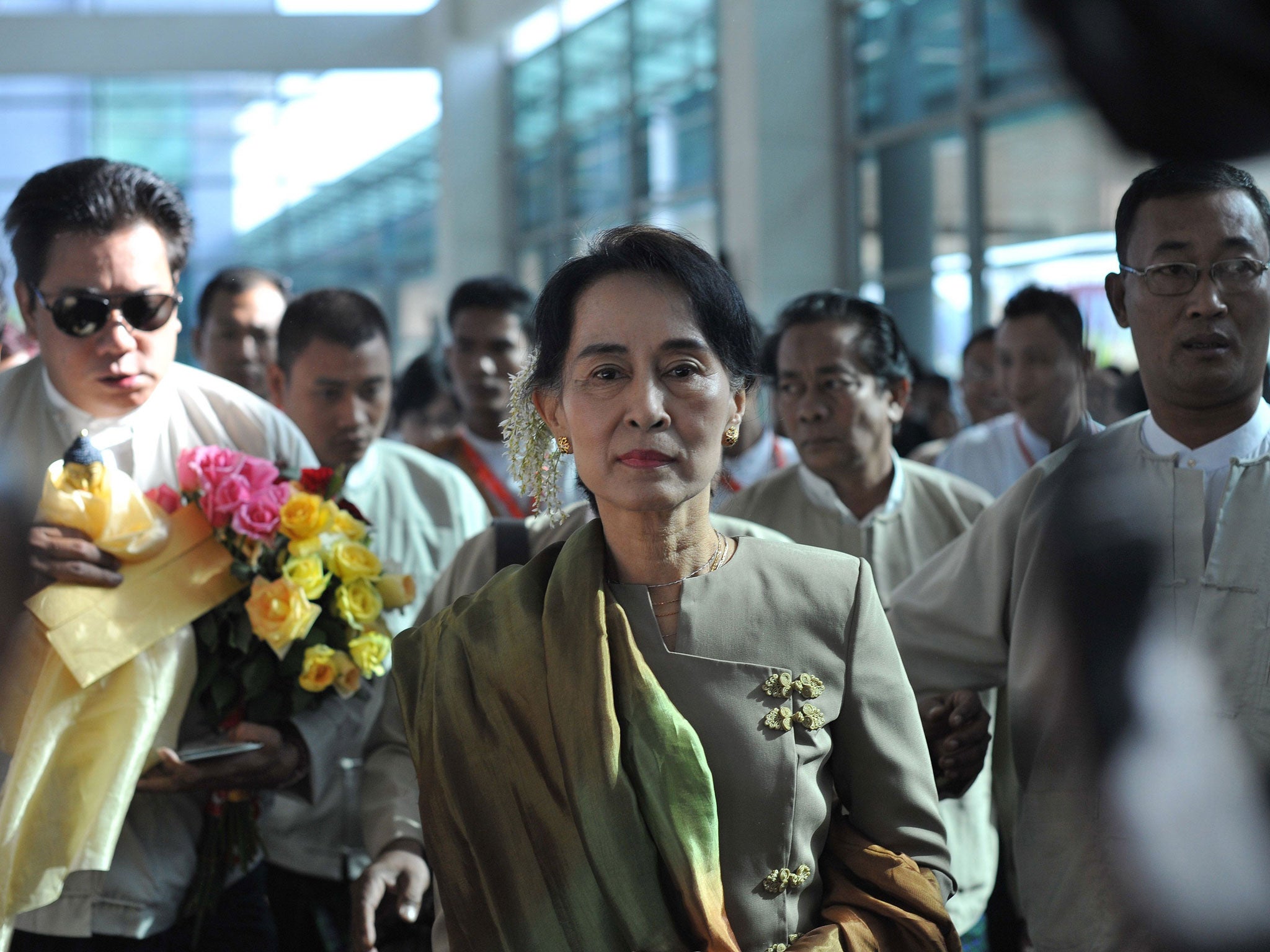Why Suu Kyi still loves Burma's army
One of her Desert Island Discs? A Tom Jones song she's never heard

Your support helps us to tell the story
From reproductive rights to climate change to Big Tech, The Independent is on the ground when the story is developing. Whether it's investigating the financials of Elon Musk's pro-Trump PAC or producing our latest documentary, 'The A Word', which shines a light on the American women fighting for reproductive rights, we know how important it is to parse out the facts from the messaging.
At such a critical moment in US history, we need reporters on the ground. Your donation allows us to keep sending journalists to speak to both sides of the story.
The Independent is trusted by Americans across the entire political spectrum. And unlike many other quality news outlets, we choose not to lock Americans out of our reporting and analysis with paywalls. We believe quality journalism should be available to everyone, paid for by those who can afford it.
Your support makes all the difference.Years of house arrest held no fear for Aung San Suu Kyi, thanks to an authoritarian mother who toughened her up. And she remains "fond" of the Burmese military despite the atrocities it committed. "The truth is that I am very fond of the army because I always thought of it as my father's army," she says.
Ms Suu Kyi was only two when her father, General Aung San, the leader of Burma's struggle for independence, was assassinated in 1947. Speaking at her home in the Burmese capital, Naypyitaw, where two paintings of her father are on the wall, she says: "My father is my first love and my best love."
Reminded of atrocities such as torture, child soldiers and rape committed by the Burmese military, she admits: "It's terrible what they've done and I don't like what they've done at all, but if you love somebody I think you love her or him in spite of and not because of."
She explains how she was taught that her father "was the father of the army and that all soldiers were his sons and that therefore they were part of my family". Speaking on today's Desert Island Discs on Radio 4, Ms Suu Kyi, 67, adds: "You always look forward to a time when they will be able to redeem themselves."
It emerged this month that her party, the National League for Democracy, had accepted donations from figures connected to the Burmese military. But Ms Suu Kyi "didn't come into politics to be popular" and says she still has ambitions. "I would like to be president ... If you are the leader of a party then you want to get government power in your hands."
She has waited a lifetime to take the power that her father could have held, leaving Burma in the 1960s and studying at Oxford University before settling down with her husband, the academic Michael Aris, and bringing up their two boys. "I never thought that domesticity was my whole life," she says, and had warned her husband on the eve of their wedding "that my country would always come first".
In 1988, her life changed completely. Returning to Burma to visit her sick mother, she realised the political unrest would be "a life-changing situation for the country as a whole".
A figurehead for protesters calling for democratic reform, she was placed under house arrest in 1989 and spent most of the following two decades in confinement. Yet she adjusted "very quickly" and "didn't feel it a burden at all", realising she was "perfectly capable of living alone".
Her mother's tough love had prepared her for what was ahead. "I thought at times she was far too strict, but when I was in a position of having to cope with things such as prison, I was very grateful to her for having brought me up in such a disciplined way. I think she recognised that I tended to be a bit soft and she made sure that I wouldn't stay that way."
Freed from house arrest in 2010, she was elected to parliament last year. Referring to the past, she says: "I'm not terribly fond of melodrama. I think that when people have chosen a certain path they should walk it with satisfaction and not try to make it appear as a tremendous sacrifice."
During the interview, she chooses music "that reminds me of people who are important to me". One track, Pachelbel's Canon, represents "tranquillity and resilience". And, for the first time in the programme's history, a guest admits not having heard one of their chosen tracks, with Ms Suu Kyi confessing she doesn't know "The Green, Green, Grass of Home" by Tom Jones. After it's played, she says: "I like it. There's nothing wrong with loving one's home and family and feeling sentimental about it."
As for Burma's future, she says: "I do not think we can say that we have started the genuine process of democratisation yet, but we now have the opportunity to start."
Desert Island Discs is on BBC Radio 4 today at 11.15am and Friday at 9am
Join our commenting forum
Join thought-provoking conversations, follow other Independent readers and see their replies
Comments